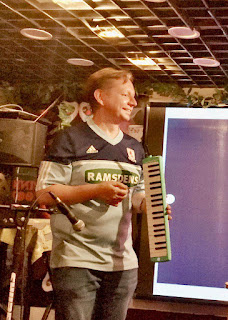In 2023, I decided to retire the literary Would You Rather series, but didn't want to stop interviews on the site all together. Instead, I've pulled together 40ish questions - some bookish, some silly - and have asked authors to limit themselves to answering only 10 of them. That way, it keeps the interviews fresh and connectable for all of us!
David
Harrison Horton is a Beijing-based writer, artist, editor and curator. He is
author of Maze Poems (Arteidolia) and the chapbooks Pete Hoffman Days (Pinball)
and BeiHai (Nanjing Poetry). He edits the poetry zine SAGINAW. davidharrisonhorton.com
What made you start writing?
When
I was a kid in elementary school, I thought it was fun to play around with
words. I think that sense of play and fun are at the root of why I pursued
writing more seriously later on.
What do you do when you’re not writing?
I
have periods when I’m writing interspersed by periods of reading. I like to
keep these activities separate if I can. When not engaged in a writing project,
I also like to make lists of things that might be interesting to write about.
Half my notebook is ideas that I might want to pursue further. The other half
is quotes from what I’m reading. It’s fun to read through these notebooks when
I start to feel that it’s time to write again. I wish I had the daily
discipline and writing practice of folks like Stephen Ratcliffe who write every
day, rain or shine. But I don’t.
What’s the best money you’ve ever spent as a writer?
I
bought a manual Smith-Corona typewriter off of Craigslist in Oakland in 2005
for $25. I also consider good pens a worthwhile expense.
What are you currently reading?
I’m
re-reading Beckett’s Molloy and just started Jennifer Nelson’s Harm
Eden (Ugly Duckling, 2021) this morning.
What’s the single best line you’ve ever read?
“and
there is nothing new under the sun” (Ecclesiastes 1.9). There are a lot of
lines from more modern and contemporary sources that I really like a lot, but
that one is a humdinger of a line.
What’s on your literary bucket list?
I’d
like to read at St. Mark’s and the 92nd Street Y in New York.
Do you read the reviews of your books or do you stay far
far away from them, and why?
I
have only had a few reviews so far of my first collection Maze Poems. I read
them with great appreciation. It’s very interesting to see how others process
the work and the connections that get drawn to other works or schools as part
of that processing. I think reviewing is important work. Reviews, social media
posts, comments on Good Reads and Amazon, etc . . . these are all very
important to the life of small press books. I wish more poets would review
books more.
What’s the one thing you wish you knew when you were
younger?
I
wish I had had more contact with other poetic traditions from around the world
earlier. While I’ve barely scratched the surface on this, I’ve found reading
classic and modern texts from outside the West very fruitful. I’m not sure how
much this has impacted how I write, but it has definitely expanded my
understanding of different approaches that can be taken.
What are your bookish pet peeves?
Peeve
might be too strong a word, but with poetry, I am very interested in the
mechanics of the poems, how the poems work as poems, and how they work together
in conversation as a collection. When I read a book that seems more like diary
entries, for example, I sometimes wish the writer had put a little more time
into tightening the language to ratchet up the tension and cohesion of the
pieces presented. But I accept that different writers have different
priorities, so maybe peeve is too strong a word for this.
Are you a book hoarder or a book unhauler?
I seem to amass a lot of books, but I try to give away as many books as I can to people who I think would enjoy them. I’d rather give these books to friends than sell them to a secondhand bookstore. There are only a couple of books that have made several moves with me.
~~~~~~~~~~~~~~~~~~~~~~~~~~~~~~~~~~~~
Maze
Poems by David Harrison Horton blend
Montaigne-esque essay with the surrealist practice of automatic writing. The
thought and language of each fit within a visual maze format, literally the
shape of that thought. Or rather, each thought fits the shape of its maze.
“David
Harrison Horton has successfully slowed down the reading experience and made it
deliberate, the charms of the poems reveal themselves when you take the time to
unlock them, but these phrases and images lock themselves away again even
before you have finished reading the poem. This makes for a challenging reading
experience, but a challenge necessitated by a bold and inventive new format.”
– Eyad Darras from Canonical Podcast
Buy a copy here:
https://www.arteidolia.com/arteidolia-press-maze-poems-by-david-harrison-horton/



No comments:
Post a Comment